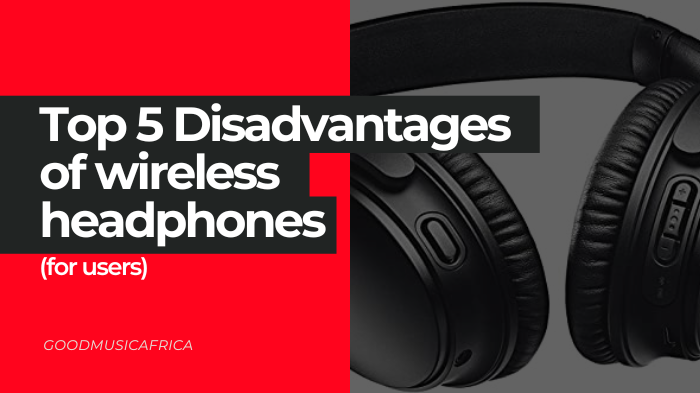
Introduction | Disadvantages of wireless headphones
Yes, wireless headphones have gained immense popularity in recent years, thanks to their convenience and ease of use. With no wires to untangle or limit movement, they provide a liberating listening experience.
However, like any technology, wireless headphones have their share of drawbacks. In this article, we will explore some of the most significant disadvantages of wireless headphones that every potential buyer should consider before making a purchase.
While wireless headphones may seem like the perfect audio accessory, they come with some major drawbacks that can significantly impact the user experience.
From limited battery life to potential connectivity issues and sound quality differences, there are several reasons why someone might reconsider buying wireless headphones. In this article, we will delve into these disadvantages in detail and help you make an informed decision.
Benefits before the Disadvantages of wireless headphones
- Wireless headphones have become increasingly popular in recent years due to their convenience and ease of use.
- They eliminate the hassle of tangled wires and provide a liberating listening experience.
- Portability.
- Flexibility, and the ability to move around without restrictions.
1. Disadvantages of wireless headphones | Battery Life
This section talks about batter disadvantages of wireless headphones with respect to:
- Limited battery life of wireless headphones
- The inconvenience of having to charge them frequently
- The frustration of running out of battery mid-use
One of the biggest disadvantages of wireless headphones is their limited battery life.
Users may need to charge their wireless headphones more frequently, which can be inconvenient and frustrating.
While some wireless headphones come with a charging case that can provide extra battery life, it’s important to remember that this is still not a perfect solution.
When considering wireless headphones, it’s important to check their battery life and make sure that it will be sufficient for your needs.
Ultimately, if you are someone who frequently uses headphones for extended periods, you may need to consider the inconvenience and potential frustrations of having to charge your wireless headphones more often than you would with wired headphones.
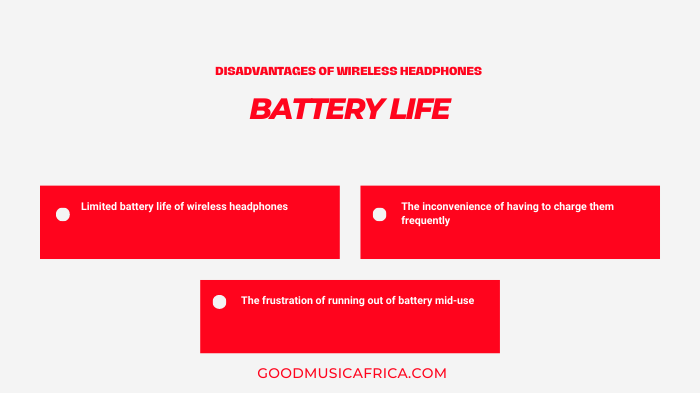
2. Disadvantages of wireless headphones | Connectivity Issues
This section talks about the disadvantages of wireless headphones with respect to;
- Potential for connectivity issues.
- How distance, obstacles, and other factors can interfere with the Bluetooth connection.
- Stress of having to troubleshoot connectivity problems.
While wireless headphones offer the freedom to move around without restrictions, they also come with the potential for connectivity issues.
Bluetooth is the most common technology used for wireless headphones, and its performance can be affected by various factors such as distance, obstacles, and other wireless devices in the vicinity.
The distance between the headphones and the source device can impact connectivity.
Other wireless devices in the vicinity can also interfere with the Bluetooth connection of wireless headphones.
If multiple devices are using Bluetooth simultaneously, they can cause interference and disrupt the connection.
Finally, troubleshooting connectivity problems with wireless headphones can be frustrating and time-consuming.
Users may need to reset their headphones, disconnect and reconnect Bluetooth, or troubleshoot the source device to fix connectivity issues.
When considering wireless headphones, it’s important to understand the potential for connectivity issues and how they may impact your experience.
Checking the Bluetooth range and researching the connectivity performance of different models can help you avoid these issues.
However, it’s important to remember that even the best wireless headphones can still experience connectivity problems from time to time.
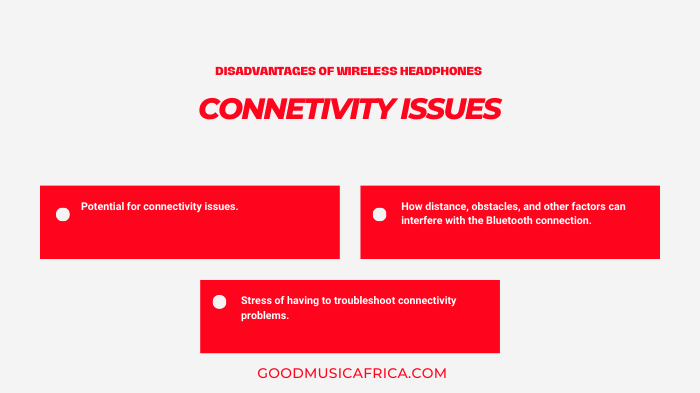
3. Disadvantages of wireless headphones | Sound Quality
This section covers the disadvantages of wireless headphones with respect to:
- Acknowledging that wireless headphones have improved significantly in sound quality over the years.
- Yet there may still be a noticeable difference in sound quality compared to wired headphones.
- The quality of the audio also depends on the type of codec and Bluetooth standard used the device and the headphones.
One of the primary concerns for audiophiles and music enthusiasts when it comes to wireless headphones is sound quality.
While wireless headphones have improved significantly in this regard over the years, there may still be a noticeable difference in sound quality compared to wired headphones.
The quality of the audio transmitted via Bluetooth depends on several factors, including the type of codec and Bluetooth standard supported by the device and the headphones.
Additionally, the Bluetooth standard supported by the device and headphones can impact sound quality.
However, not all devices and headphones support the latest Bluetooth standards, and using an older standard can result in lower quality audio.
It’s important to note that sound quality is subjective and may vary depending on personal preference and the type of music being listened to.
However, the potential for lower sound quality is a notable disadvantage of wireless headphones that should be considered when making a purchasing decision.
In conclusion, while wireless headphones have improved significantly in sound quality over the years, there may still be a noticeable difference in comparison to wired headphones.
Ultimately, the potential for lower sound quality is a disadvantage of wireless headphones that users should consider when making a purchasing decision.
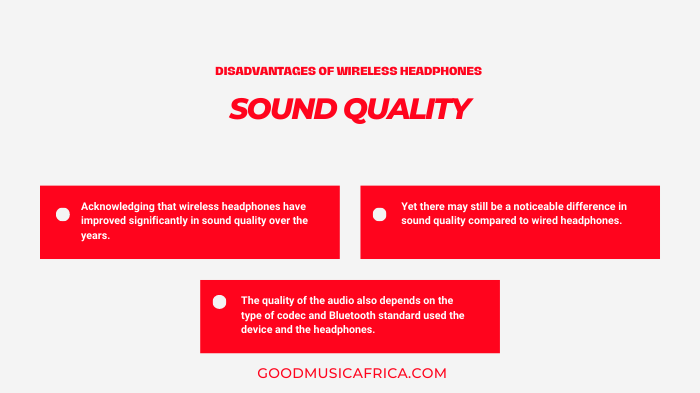
4. Disadvantages of wireless headphones | Price
This section talks about disadvantages of wireless headphones with respect to:
- The cost of wireless headphones compared to wired headphones
- Wireless headphones tending to be more expensive
- How the cost may be prohibitive for some users
Another disadvantage of wireless headphones is their cost.
The cost of wireless headphones can vary significantly, depending on factors such as brand, features, and quality.
However, even the most affordable wireless headphones tend to be more expensive than their wired counterparts. (This is due to the additional technology required to transmit audio wirelessly.)
For some users, the cost of wireless headphones may be prohibitive, especially if they’re on a tight budget.
It’s important to consider the cost-benefit ratio when deciding whether to purchase wireless headphones.
While the disadvantages of wireless headphones, such as limited battery life and potential connectivity issues, may be a turn-off for some users, others may find that the benefits outweigh the cost.
Ultimately, the decision to purchase wireless headphones will depend on individual preferences and priorities.
If sound quality, convenience, and portability are top priorities, then the cost of wireless headphones may be worth it.
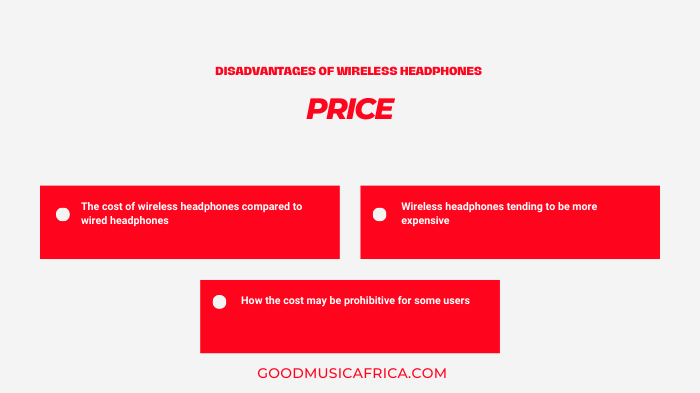
5. Disadvantages of wireless headphones | Health Concerns
This 5th section talks about the disadvantages of wireless headphones with respect to:
- The potential health concerns associated with wearing wireless headphones for extended periods
- The concerns around the close proximity of Bluetooth radiation to the head
- The importance of taking breaks from headphone use to avoid these concerns
Our last potential disadvantages of wireless headphones is the health concerns associated with wearing them for extended periods.
While there is no conclusive evidence linking wireless headphones to negative health effects, some experts warn that the close proximity of Bluetooth radiation to the head could pose a risk.
While this type of radiation is generally considered safe, some studies have suggested that prolonged exposure to Bluetooth radiation could have negative health effects, such as:
- Increased risk of cancer
- Headaches, and other health issues.
To mitigate these potential health risks, experts recommend taking breaks from headphone use and limiting the amount of time spent wearing wireless headphones.
This can help reduce exposure to Bluetooth radiation and minimize the risk of negative health effects.
It’s also important to choose high-quality wireless headphones that are designed with safety in mind.
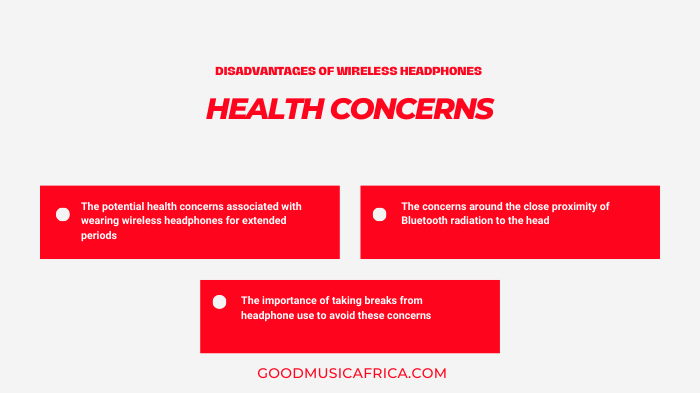
Look for Wireless headphones that are:
- Designed to emit low levels of radiation
- Have built-in safety features,
- And are certified by reputable organizations.
In addition to potential health concerns, wearing wireless headphones for extended periods can also cause physical discomfort, such as ear fatigue and soreness.
To avoid physical discomfort, experts recommend taking breaks from headphone use, adjusting the fit of the headphones, and choosing headphones that are lightweight and comfortable.
By taking breaks from headphone use, choosing high-quality headphones, and limiting exposure to Bluetooth radiation, users can enjoy the benefits of wireless headphones while minimizing the potential disadvantages.
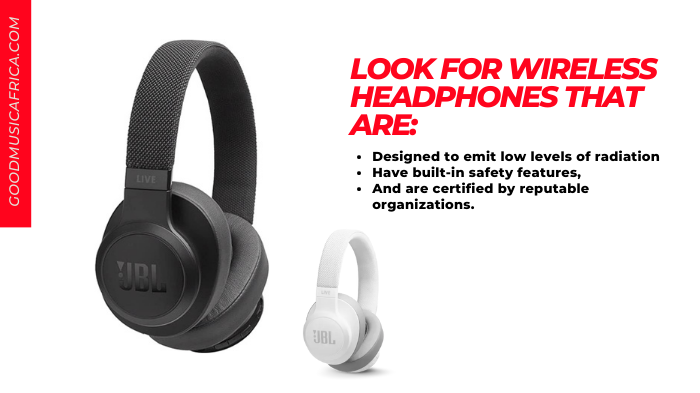
FAQ
Do you have more questions about the disadvantages of wireless headphones? We have answers to some of the most frequently asked questions.
While wired headphones generally provide higher audio quality at a lower price point, wireless headphones offer greater portability and convenience. It’s important for individuals to consider their specific needs and budget when deciding between wired and wireless options.
It’s true that wired headphones don’t emit RF waves, which some people may prefer for long-term use. Bluetooth headphones also emit low levels of EMF radiation, but the risk of harm is minimal.
While any wireless technology can potentially be vulnerable to hacking, the risk is generally low for Bluetooth headphones. It’s still a good idea to take basic security precautions, such as keeping your device and headphones up-to-date with software updates and avoiding sharing sensitive information over Bluetooth. Are wired headphones better than wireless?
Which is safer: Bluetooth or wired headphones?
Can Bluetooth headphones be hacked?
Conclusion
In conclusion, the disadvantages of wireless headphones should not be ignored when making a purchase decision.
While they provide a liberating listening experience, they also come with potential downsides such as limited battery life, connectivity issues, sound quality differences, higher cost, and potential health concerns.
It is important to carefully consider these factors and weigh them against the benefits before deciding on whether to invest in wireless headphones.
For those who are willing to pay a premium for high-quality wireless headphones, it’s important to do thorough research on the specific model and its features to ensure the best possible listening experience.
Ultimately, it’s up to the individual to decide whether the advantages outweigh the disadvantages when it comes to wireless headphones.
POSTED IN: Audio Equipment, Musician Tips
